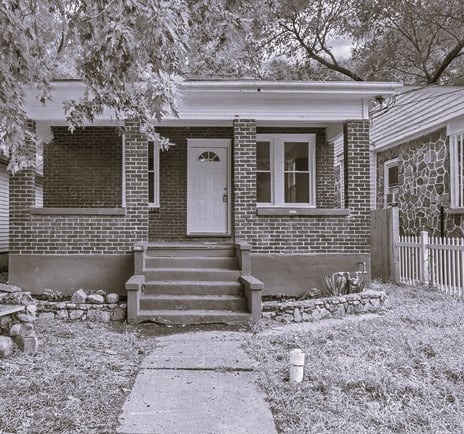Grotesque
FLASH
By Timons Esaias
9/16/2025


Many occurrences in life appear grotesque, distorted. But frequently it's the simplicity of our outlook on matters not familiar to ourselves that gives the distortion to appearances. We are surprised by the weird effects the world produces from simple causes. And my work, homicide investigation, always has to do with simple causes.
I had a case last year that gave me the creeps. It wasn't the crime itself, I'm really quite used to that sort of thing. It was the problem we had finding the bodies.
We'd caught the fellow, a real nut, or rather, Burglary Division had caught him trying to break into a nursing home. We were only interested because he'd confessed to six murders from our unsolved list by the time they got him into the car. The lieutenant made the mistake of allowing him to show them where he'd buried three of the victims. Mistake, in that he hadn't seen a lawyer yet, and couldn't afterward remember having been read his rights. Oh, and Burglary doesn't yet have bodycams.
Typical police situation: one confessed mass murderer, (highly certifiable), a complete description of how the crimes were committed, three corpses, and no case.
An entire shift later the Prosecutor's office happily informs us that if we now go and dig up another body, we've got him airtight. But the M.E. says, "Fine, great; but I've got a morgue-full of train-wreck victims from a thousand miles away and you can just wait 'til Monday before you bring me anything more. Just hold him on Breaking and Suspicion and I'll send a man down to watch the place so no-one else digs them up."
Fine. Great. So we waited two days, but the M.E. didn't have a spare man to send. Result: my crew arrived at a small brick residence at 9:00 a.m. to find the back yard (our site) completely dug up.
I had just as completely lost my temper by the time I arrived. But our work had been saved, apparently. The owners were adding a huge patio-deck; the yard had been dug into in 120 places in order to sink the 4"x4" uprights. 120 three-foot pits in a yard that size and not a single body found. (The first three, at the other location, had been shallowly buried and the sod much disturbed.) I interviewed each of the laborers and got the same response from all. No, they hadn't seen any disturbed sod; no, there weren't any previously dug areas; no there weren't any bodies. They seemed cooperative, but more interested in getting permission to continue working on the deck than in my murder investigation.
One of the bodies would have been buried the previous Tuesday, and they'd started that Monday, so I asked about disturbances in their holes. No; they poured the concrete plugs after each hole was dug, no-one could have snuck in a body, and only 'some nut who wanted caught would bury a body where people were digging anyway, so could they get back to work already?'
I sympathized. For most folks these days the numbers just don't add up. The economy was hitting the self-employed contractor hard, and these fellows had just lost two weeks' pay from a client welshing on a deal. And what workingman, who tries for reasonable honesty, can afford to go to court? So I said, "Go ahead," since what was the point?
That night I'm sitting with my feet up on the rail of my back porch, much smaller than the one being built where those bodies should have been. Should have been. I tried to come up with some clever idea that would make it all make sense. I had a few beers, smoked a cigar, came up with some really off-the-wall scenarios.
But about midnight I realized something. Those bodies were there all right, or had been. So, how do three bodies elude a crew who dig 120 holes in a small space? Assuming . . .
120 holes. Five men. A week. Seven days, since they worked the weekend. Now, with the tools they had, and the soil isn't that hard, a man can dig one of those pits and set the post in an hour. Eight hours in a day . . .
Ha! Talk about the numbers not adding up.
So I called my sergeant, who checked and told me that the building inspector had butted his ugly head in on Tuesday morning and stopped the work for lack of a proper permit. City Hall, bless its for-the-people heart, had tied the whole thing up 'til Friday, costing five nearly broke men 3 ½ days' work and $300 extra in fees.
The bodies were there, all right. And when the first one was found, on Saturday -- how grotesque that must have been -- the poor fellows could only see endless police, and trips to the precinct, and testimony, and more lost time, and probably the whole project stopped, and rent unpaid, and truck payments . . .
So, they carefully reburied it . . . somewhere. And the second, when they came to it. And the third.
Simple, really.
These days, the numbers just don't add up.
BIO: Timons Esaias is a satirist, writer and poet living in Pittsburgh. His works, ranging from literary to genre, have been published in twenty-two languages. He has also been a finalist for the British Science Fiction Award, and twice won the Asimov's Readers Award. His story "Norbert and the System" has appeared in a textbook, and in college curricula. He was shortlisted for the British Science Fiction Award and for the 2019 Gregory O'Donoghue International Poetry Prize. His full-length Louis-Award-winning collection of poetry -- Why Elephants No Longer Communicate in Greek -- was brought out by Concrete Wolf.
Follow on Social
Literary Garage: Storytelling with grit, heart, and no off-ramp.
© 2025. All rights reserved.
Connect


editor@literarygarage.com
Follow us on Substack for updates and news
Clicking thE SUBSTACK link will direct you to an external website for our Substack feed. The content and privacy practices of Substack are not controlled, and no responsibility is taken for any issues that may arise on the platform.
